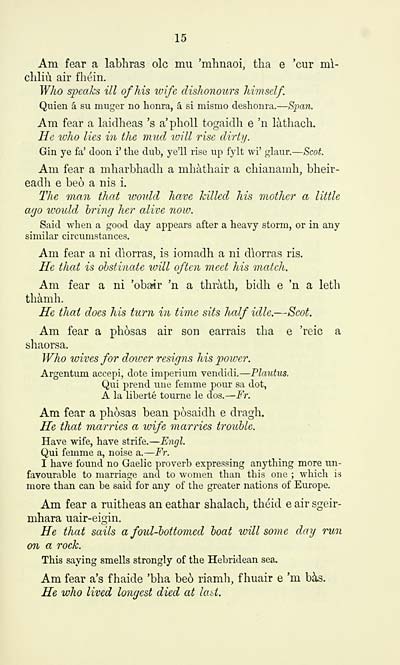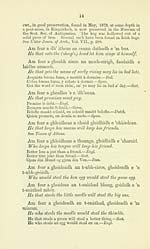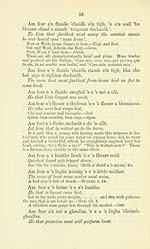Download files
Complete book:
Individual page:
Thumbnail gallery: Grid view | List view

15
Am fear a labhras olc mu 'mhnaoi, tha e 'cur ml-
cliliù air fhein.
Who speaks ill of his wife dishonours himself
Quien a su muger no honra, a si mismo deshonra. — Span.
Am fear a laidheas 's a'pholl togaidh e 'n làtliach.
He who lies in the mud loill rise dirty.
Gin ye fa' doon i' the dub, ye'll rise iip fylt wi' glaur. — Scot.
Am fear a mliarbhadh a mliàtliair a chiauamli, blieiv-
eadh e beò a nis i.
The man that would have killed his mother a little
ar/o woidd bring her alive now.
Said when a good day appears after a heavy storm, or in any
similar circumstances.
Am fear a ni diorras, is iomadh a ni dlorras ris.
He that is obstinate loill often meet his match.
Am fear a ni 'obair 'n a thràth, bidh e 'n a leth
thàmb.
He that does his turn in time sits half idle. — Seot.
Am fear a phòsas air son earrais tha e 'reic a
shaorsa.
Who wives for dotver resigns his power.
Argentum accepi, dote imperium vendidi. — Plautus.
Qui prend une femme pour sa dot,
A la liberte tourne le dos. — Fr.
Am fear a pbòsas bean pòsaidh e dragh.
He that marries a vnfe marries trouble.
Have wife, have strife. — Engl.
Qui femme a, noise a. — Fr.
I have found no Gaelic proverb expressing anything more un-
favourable to marriage and to women than this one ; which is
more than can be said for any of the greater nations of Europe.
Am fear a ruitheas an eathar shalach, tlieid e air sgeir-
mhara uair-eigin.
He that sails afoul-bottomed boat will some day run
on a rock.
This saying smells strongly of the Hebridean sea.
Am fear a's f haide 'bha beò riamh, f huair e 'm bàs.
He who lived longest died at la hi.
Am fear a labhras olc mu 'mhnaoi, tha e 'cur ml-
cliliù air fhein.
Who speaks ill of his wife dishonours himself
Quien a su muger no honra, a si mismo deshonra. — Span.
Am fear a laidheas 's a'pholl togaidh e 'n làtliach.
He who lies in the mud loill rise dirty.
Gin ye fa' doon i' the dub, ye'll rise iip fylt wi' glaur. — Scot.
Am fear a mliarbhadh a mliàtliair a chiauamli, blieiv-
eadh e beò a nis i.
The man that would have killed his mother a little
ar/o woidd bring her alive now.
Said when a good day appears after a heavy storm, or in any
similar circumstances.
Am fear a ni diorras, is iomadh a ni dlorras ris.
He that is obstinate loill often meet his match.
Am fear a ni 'obair 'n a thràth, bidh e 'n a leth
thàmb.
He that does his turn in time sits half idle. — Seot.
Am fear a phòsas air son earrais tha e 'reic a
shaorsa.
Who wives for dotver resigns his power.
Argentum accepi, dote imperium vendidi. — Plautus.
Qui prend une femme pour sa dot,
A la liberte tourne le dos. — Fr.
Am fear a pbòsas bean pòsaidh e dragh.
He that marries a vnfe marries trouble.
Have wife, have strife. — Engl.
Qui femme a, noise a. — Fr.
I have found no Gaelic proverb expressing anything more un-
favourable to marriage and to women than this one ; which is
more than can be said for any of the greater nations of Europe.
Am fear a ruitheas an eathar shalach, tlieid e air sgeir-
mhara uair-eigin.
He that sails afoul-bottomed boat will some day run
on a rock.
This saying smells strongly of the Hebridean sea.
Am fear a's f haide 'bha beò riamh, f huair e 'm bàs.
He who lived longest died at la hi.
Set display mode to: Large image | Transcription
Images and transcriptions on this page, including medium image downloads, may be used under the Creative Commons Attribution 4.0 International Licence unless otherwise stated. ![]()
| Early Gaelic Book Collections > J. F. Campbell Collection > Collection of Gaelic proverbs and familiar phrases > (59) |
|---|
| Permanent URL | https://digital.nls.uk/78589068 |
|---|
| Description | Volumes from a collection of 610 books rich in Highland folklore, Ossianic literature and other Celtic subjects. Many of the books annotated by John Francis Campbell of Islay, who assembled the collection. |
|---|
| Description | Selected items from five 'Special and Named Printed Collections'. Includes books in Gaelic and other Celtic languages, works about the Gaels, their languages, literature, culture and history. |
|---|

